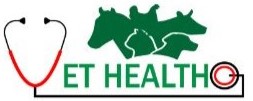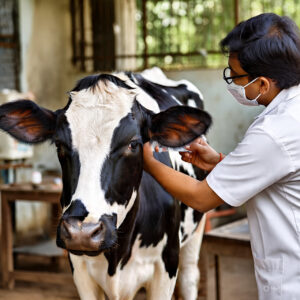Fever in Cows: Common Causes, Symptoms, and Effective Remedies
Fever in cows is one of the most common health concerns faced by dairy farmers and cattle owners. A rise in body temperature can indicate infection, inflammation, or other underlying health issues. Early identification and timely treatment are crucial to prevent long-term effects on milk production and the overall health of the cow.
🔍 What is Fever in Cows?
Fever in cows is defined as an increase in body temperature beyond the normal range. The normal body temperature of a healthy cow ranges between 101.5°F to 103°F (38.6°C to 39.4°C). A temperature above this may indicate the cow is suffering from a fever.
🧾 Common Causes of Fever in Cows
- Bacterial Infections:
Diseases like mastitis, pneumonia, or metritis are common causes of bacterial-induced fever. - Viral Infections:
Viruses such as Foot-and-Mouth Disease (FMD), Lumpy Skin Disease (LSD), and Bovine Viral Diarrhea (BVD) can cause fever. - Parasitic Infestations:
Tick-borne diseases like Theileriosis or Babesiosis often lead to high fever. - Digestive Disorders:
Conditions like indigestion, bloat, or acidosis can also result in elevated body temperatures. - Injury or Inflammation:
Physical trauma, wounds, or internal inflammation can trigger fever. - Environmental Stress:
Extreme heat, cold, or sudden changes in climate can stress the animal and cause fever-like symptoms.
🔎 Symptoms of Fever in Cows
- Reduced feed intake or complete loss of appetite
- Lethargy and dullness
- Shivering or excessive sweating
- Increased heart rate and breathing
- Decreased milk production
- Warm and dry muzzle
- Restlessness or lying down continuously
💊 Remedies and Treatment for Fever in Cows
1. Consult a Veterinarian:
Always take professional advice to determine the exact cause of the fever before starting any treatment.
2. Cold Sponging:
Use clean, cold water to sponge the cow’s body to help lower body temperature.
3. Antibiotics & Antipyretics:
If the fever is due to bacterial infections, the vet may prescribe antibiotics along with fever-reducing medications.
4. Deworming:
If parasitic infection is the cause, deworming should be done immediately.
5. Hydration:
Ensure the cow is hydrated. Provide clean, cool water and electrolyte solutions if required.
6. Herbal or Natural Remedies:
Some farmers use herbal formulations like Giloy, Tulsi, or Neem decoctions as supportive care under expert advice.
🧼 Preventive Measures
- Maintain hygiene in cattle sheds
- Regular vaccination and deworming
- Provide a balanced diet and clean water
- Reduce environmental stress by proper ventilation and shade
- Monitor cows daily for early signs of illness




